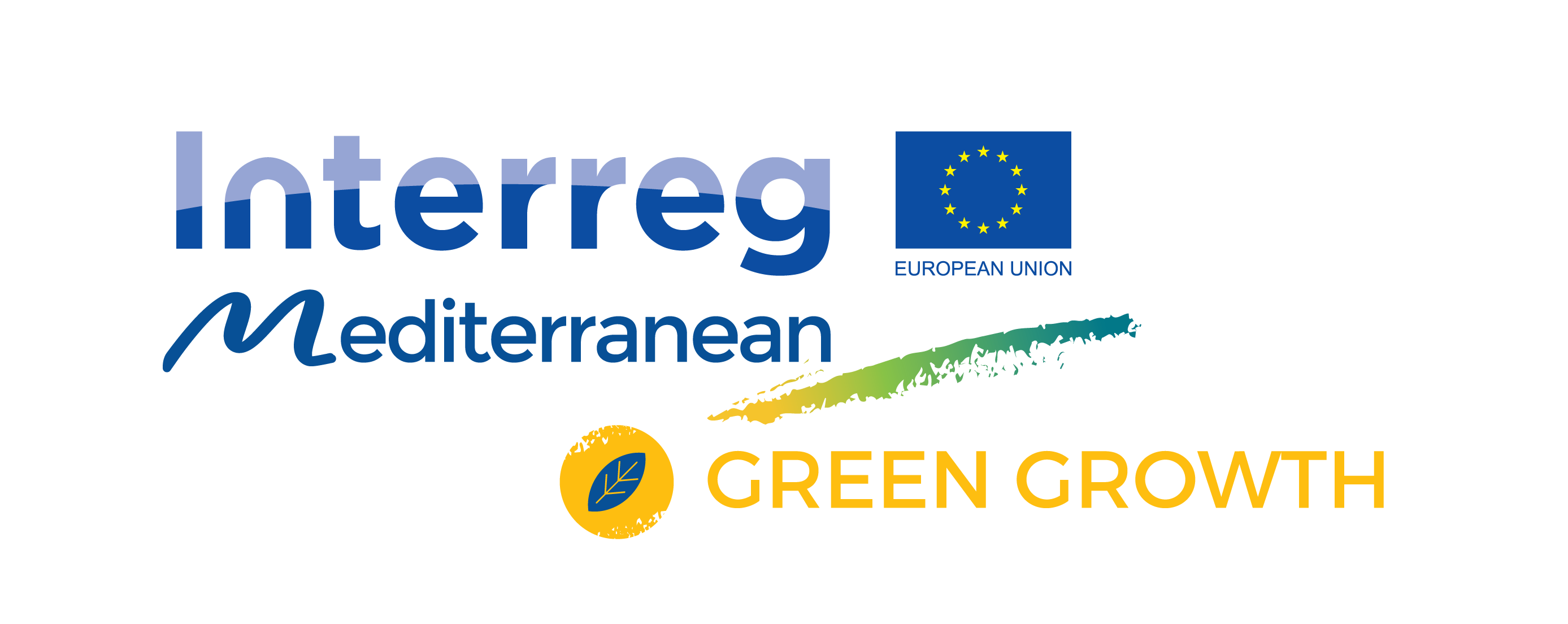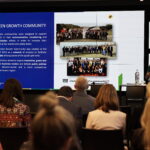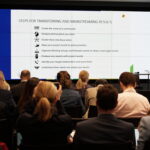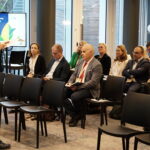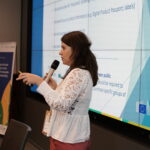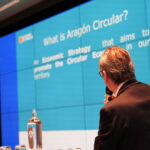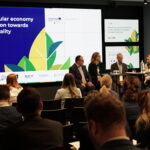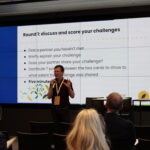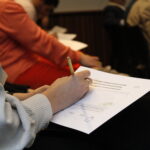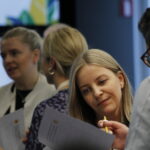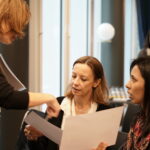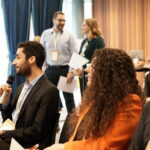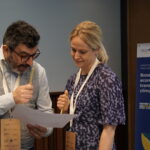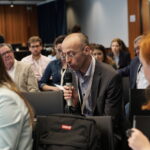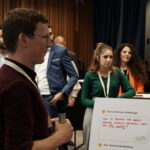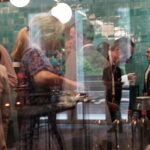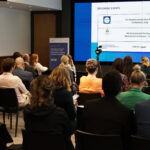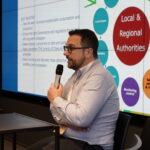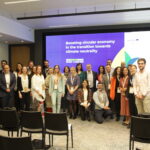The Interreg MED Green Growth project celebrated its final project event on 1st June in Brussels, within the framework of the EU Green Week. The event was an opportunity to share the community’s knowledge and think collaboratively about potential solutions to the current challenges to boosting the circular economy in the Mediterranean.
The Interreg Med Green Growth Community (GGC) gathered in TownHall Europe in Brussels on 1st June for the final project event, focusing on the role of local stakeholders in the circular economy transition. The speakers brought their knowledge and diversity of perspectives on how to tackle the challenges of achieving climate neutrality in the Euro-Mediterranean region. The morning sessions focused on how businesses and public authorities can cooperate and contribute to moving away from the currently dominant and unsustainable linear economy.
César Luena – Member of the European Parliament (MEP) and Vice-Chair of the Committee on the Environment, Public Health and Food Safety – gave the keynote speech, sharing the new strategies to make sustainable products the new norm in the European Union (EU). According to Luena, the EU is committed to reducing the environmental and carbon footprint of products: “The new [EU] regulation on eco-design concerns up to 80% of the product’s lifecycle environmental impact”, affirmed Luena. The MEP also highlighted that better circularity means better reduction of waste and of the footprint of the product, using the Green Growth Community’s REINWASTE project as a great example of how to achieve this in the agri-food sector.
Maria Rincon Lievana – Team Leader on Circular Economy at DG ENV (European Commission) – followed Luena’s intervention by bringing in the Commission’s perspective and action plan. Rincon explained how the Circular Economy Action Plan is contributing to achieving the EU Green Deal’s objectives, setting the Circular Economy Package, adopted in March 2022 as a key milestone. There are a number of legislative frameworks working towards this goal, including the Sustainable Product Policy Framework and the Regulation on Ecodesign for Sustainable Products (ESPR). Rincon also named the European Circular Economy Stakeholder Platform (ECESP) as an important stakeholder engagement tool to strengthen cooperation and networks. The Green Growth Community is already part of the ECESP coordination group, working to transition towards a circular economy.
Miguel Luis Lapeña Cregenzán – General Director of Planning and Economic Development of the Government of Aragón (Spain) – presented the Aragón Circular strategy, that aims to promote a circular economy in the Spanish region of Aragon. With this strategy, the Government is supporting local businesses in their journey towards a circular economy. As well as sharing statistics to show the impact of the Aragón Circular strategy, Lapeña highlighted the knowledge acquired from participating in the Green Growth Community’s EMBRACE project to support the circular economy transition in the agri-food and wine sectors.
Following the institutional interventions, Cristina Giner – Freelance Journalist & Presenter at EURONEWS – led a panel discussion that delved into how to transfer circular solutions towards businesses and public authorities. Emilia Arrabito – Director of the EuroMediterranean Center for Sustainable Development –, Massimo Ianniciello – Project Manager, Terre di Siena Lab – and Maurizio Notarfonso, – Head of European Projects at Federalimentare – represented the Green Growth Community’s ARISTOIL Plus, GRASPINNO Plus and PEFMED Plus projects, respectively. Panellists shared the best practices learnt from the project’s development, as well as the barriers that must still be addressed. Representatives from the Green Growth Community’s projects GREENOMED, CREAINNOVATION, CAMARG and EMBRACE also participated in the discussion, bringing in their experiences from the implementation of their projects.
How do we break silos and keep stakeholders engaged?
The morning session of the Green Growth Community’s final event was wrapped up with an interactive activity led by Stickydot, requiring all attendees’ active participation to identify the key challenges to boost the circular economy. Participants were posed the question ‘What are the biggest challenge to bringing together public authorities, businesses and other stakeholders to address circular economy issues?’, and participants selected the five main challenges they faced, and discussed each of these to share recommendations.
The most common challenges identified were how to build trust and improve collaboration between stakeholders, how to keep stakeholders engaged over time, how to attract economic investment, and, how to promote the green economy without additional costs for civil society. Improving communication and awareness, implementing medium-term projects, and creating funding incentives were some of the recommendations that emerged from this exercise.
Local stakeholders: key actors in the circular economy transition
Alessandra Sensi – Head of Sector, Environment and Blue Economy at the Union for the Mediterranean (UfM) – opened the final event’s afternoon session by focusing on the importance of cooperation among actors and different regions across the EU and Mediterranean region. Sensi highlighted the importance of partnerships and multi-stakeholder approaches to achieve the transition towards climate neutrality. The 2030GreenerMED Agenda is a key element in the UfM’s upcoming plans and activities. The 2030GreenerMED Agenda gives a political and operational convergence to accelerate the Mediterranean region’s transition towards a green, circular, and inclusive economy. The Green Growth Community – as an UfM labelled project – is part of the 2030GreenedMed Agenda, as explained by Sensi in her intervention.
Francesco Lembo – Managing Director, ACR+ – was the second speaker of the afternoon session, building on the importance of cooperation, and the role of local stakeholders in the circular economy transition. ACR+ has been “connecting the dots of circularity” since 1994, and currently has 1,100 municipalities represented in 25 countries across the European Union.
The second-panel discussion was led by the Green Growth Community project partners Gaetano Zarlenga – Managing Director at CUEIM –, Konstantina Marousi – Senior Project Manager at Dynamic Vision –, and Nadira Berbić – Project Manager at CENER 21 –, delving into the role of local stakeholders in enabling the transition towards circular communities. The panellist shared their lessons learnt on community building and stakeholder engagement to improve collaboration with local actors. The panel was moderated by Cristina Giner, with additional interventions by Valeria Stacchini – Città Metropolitana di Bologna –, Tonito Solinas – University of Sassari – and Rosana Garcia – Junta de Andalucia – representing the Green Growth Community’s projects MADRE, RE-LIVE WASTE and REINWASTE, respectively.
Green Growth Community policy recommendations
The Green Growth Community partner Heidi Johansson – Project Manager at ERRIN – wrapped up the session by sharing the policy recommendations developed by the project. The recommendations address common challenges shared across the Community related to funding and financing, communication and collaboration, governance, capacity building, and market challenges. The project’s policy recommendations and other outputs can be found in the Green Growth Capitalisation Platform.
The event’s final intervention was given by Maria Groueva – Project Officer, Interreg MED Programme Joint Secretariat –, explaining the future partnership opportunities under the upcoming Interreg Euro-MED Programme. All information about the new funding programme can be seen on their website.
The Green Growth Community will remain active until October 2022, transferring the knowledge acquired during the six years of work it carried out in thirteen Euro-Mediterranean countries. The open-access Green Living Territories course of the Interreg Euro-MED Academy is one of the main tools developed to disseminate the Green Growth Community’s knowledge, and offers the opportunity to learn directly from the Community’s members, based on their work on the ground.
Resources:
-
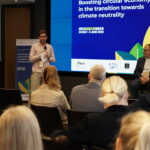
- Victori Soria giving his input to the panel discussion as CREAINNOVATION project representative| Picture: Rebecca Taouk
-
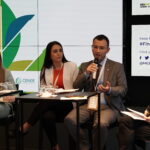
- GGC project partner discussing the role of local stakeholders in the circular economy transition| Picture: Rebecca Taouk
-
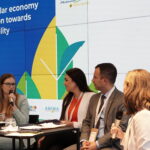
- GGC project partner discussing the role of local stakeholders in the circular economy transition| Picture: Rebecca Taouk
-
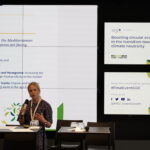
- Heidi Johansson – GGC project partner – wrapping up the event sharing the community policy outputs| Picture: Rebecca Taouk
